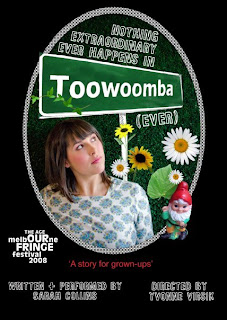There are no shiny trophies, no need to frock up and no one semi-famous to read out the nominations. In fact, there’s no prize at all, except knowing that this is the remarkable work that has inspired me over the last 12 months.
Theatre in Melbourne: even if I could go out every night, I would still miss something worth seeing.
Overall, I wish I wasn’t disappointed by so many commercial productions and wish that people who see commercial shows would also take a chance on the small, independent productions. It’s always going to be hit and miss, but this is where the best theatre continues to be created and it hurts knowing that it’s only seen by a lucky few.
That’s not to say it’s all been good, but it isn’t hard to remember the great stuff. These artists and companies challenge with their content, re-invent form, respect the intelligence of their audiences, and refuse to be bland. Some of them were visiting us from interstate and overseas, but most of this incredible theatre has been created here in Melbourne.
Before the drum roll, let me thank Jo, David, Laura, Karla, Kim and John (the wonderful team of Melbourne reviewers for Aussie Theatre) for their knowledge, their passion, their style and their from-the-heart opinions.
And thank you to everyone who lets us know that you appreciate reading what we have to say.
Outstanding Artists 2008
WRITER
Adam Cass for Oasis Oasis
and
Sarah Collins for Nothing Extraordinary Ever Happens in Toowoomba. (Ever)
DIRECTOR
Benedict Andrews for Moving Target, Malthouse Theatre
and
Yvonne Virsik for Nothing Extraordinary Ever Happens in Toowoomba. (Ever)
DESIGNER
Anna Tregloan for Venus and Adonis, Malthouse Theatre
SOUND DESIGNER
David Franzke for Venus and Adonis, Malthouse Theatre
LIGHTING DESIGNER
Paul Jackson for Moving Target, Malthouse Theatre
NEVER TO BE MISSED CREATOR/PERFORMER – female
Melissa Madden Grey, Venus and Adonis, Malthouse Theatre and Vamp, Malthouse Theatre
NEVER TO BE MISSED CREATOR/PERFORMER – male
Daniel Kitson, The Ballad of Roger and Grace and The Impotent Fury of the Privileged
FESTIVAL DIRECTOR
Kristy Edmunds for her final, unforgettable Melbourne International Arts Festivals.
Outstanding Productions 2008
CABARET
Reuben Krum's Naughty Show, Reuben Krum
and
A Suicide for Winter , The Tiger Lillies
and
Lea Delaria is Naked, Lea Delaria
MUSICAL
Spontaneous Broadway
COMMERCIAL PROGRAM
Blackbird, Melbourne Theatre Company
DANCE
Three, Batsheva Dance Company
COMEDY
Sammy J In The Forest Of Dreams
and
Cell Block Booty, Sisters Grimm
THE BEST OF THE BEST
Ollie and the Minotaur, foogle and 9minds
and
An Oak Tree, Tim Crouch/Melbourne International Arts Festival
and
Romeo and Juliet, OKT/ Melbourne International Arts Festival
The show that will stay with me from 2008 is:
The Ballad of Roger and Grace, Daniel Kitson and Gavin Osborn
(2012 update: Buy the ballad here.)
This story originally appeared on AussieTheatre.com.
























